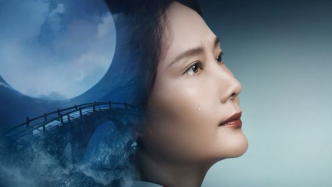
Note: This article contains spoilers
Although He Saifei won the 36th China Golden Rooster Award for Best Actress for "Chasing the Moon" and "Chasing the Moon" was specifically chosen to be released on such a meaningful day as International Women's Day, the first-day box office of "Chasing the Moon" was People regret it. On the first day, only 1.3% of the films were scheduled nationwide, and the box office on the first day was less than 500,000. In a city where the author lives, with a permanent population of nearly 9 million, less than 10 theaters in the city had scheduled this movie, and the number of screenings was pitifully few; on the second day of the release, there was only one theater in the city that had two screenings.
On weekdays, we often talk about supporting more female films and giving more diverse performance opportunities to middle-aged and older female actors. However, when such a work actually appears on the market, it does not receive the support it deserves. If it's a bad movie, that's fine, but "Chasing the Moon", which won a Golden Rooster Best Actress, is obviously not in this category.
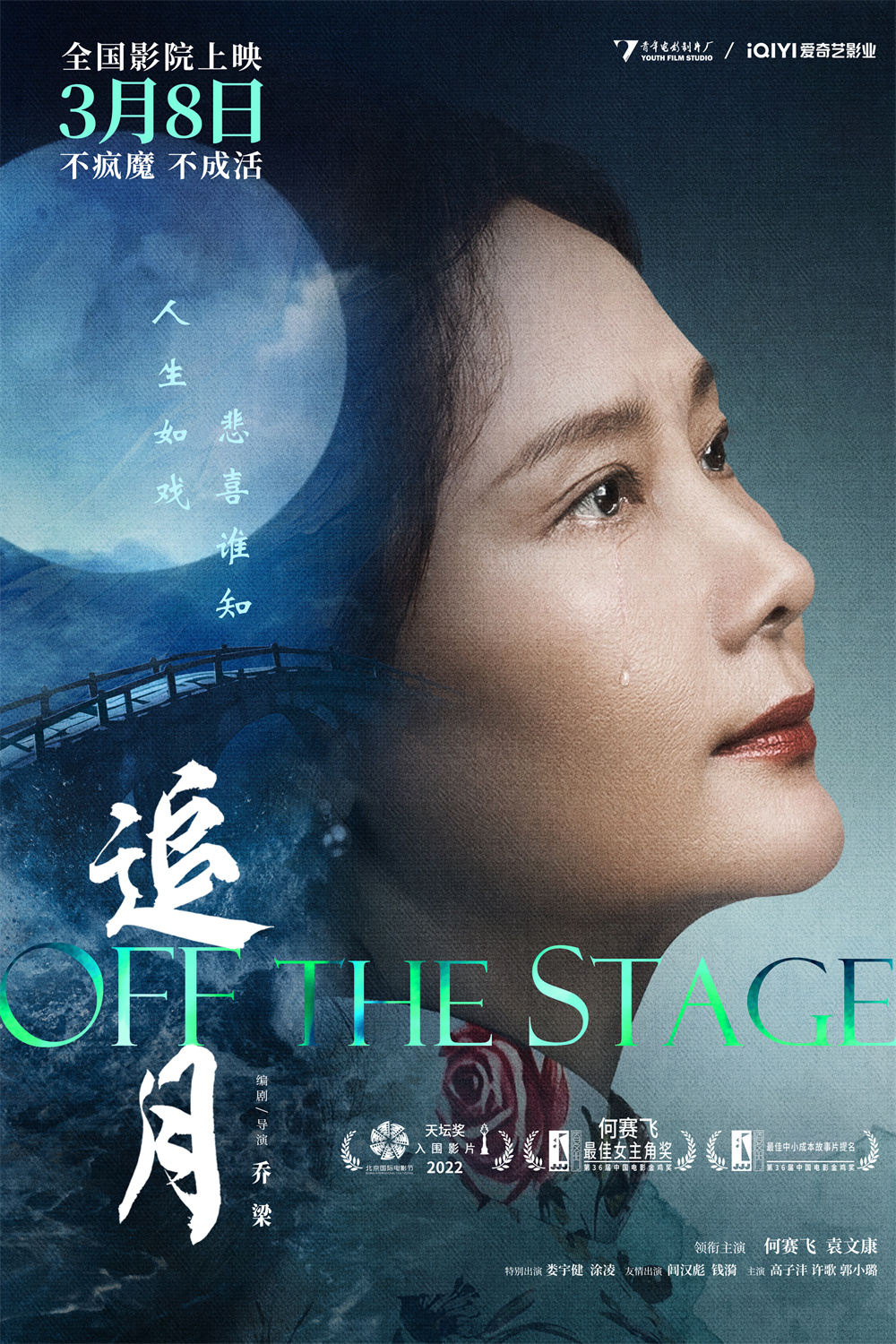
"Chasing the Moon" poster
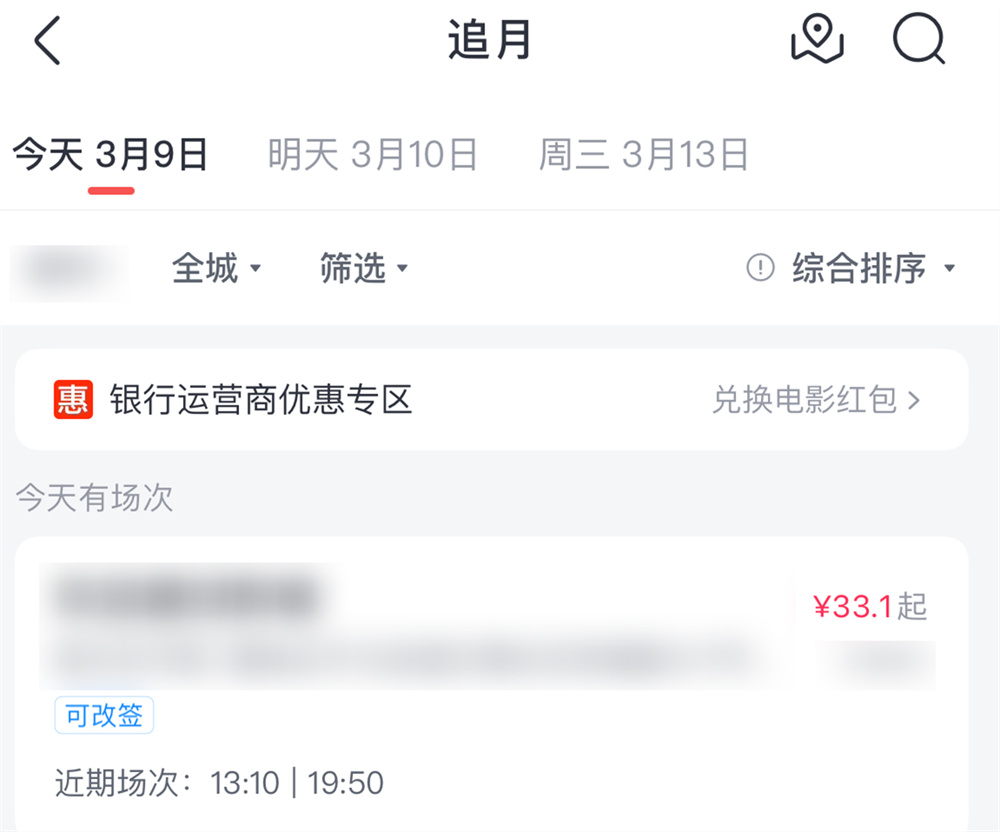
On the second day of release, there were only two shows in a city with a population of nearly 9 million.
It is true that "Chasing the Moon" is a movie with obvious shortcomings. For example, it may be limited by limited investment, the audio-visual language is too much for a TV movie, and the rhythm of the movie is somewhat improperly controlled, especially the lengthy and weakened last 20 minutes of the movie. The emotional impact of the movie; but its advantages are also obvious, not only because of He Saifei's wonderful performance, but also because the teacher Qi she portrayed in the movie is a female character recorded in the history of Chinese movies.
From "Humans, Ghosts, Love", "Farewell My Concubine" to this time "Chasing the Moon", opera themes have always been the best vehicle for gender exploration in Chinese films. On the one hand, the diverse gender presentation of Chinese opera provides rich material for movies. In Chinese opera, male characters can play female roles (such as Dan), and female characters can also show heroic temperament (such as Daoma Dan). This fluidity and diversity of gender provides a broad space for exploration of issues such as gender identity and gender relations. On the other hand, Chinese opera concepts such as "the drama is as big as the sky" and "you can't live without going crazy" subtly wrap the performers' lives in opera stories. With the help of the formal beauty and profound connotation of the opera art, the film presents the opera people The social gender conflict becomes more tense.
The completion of "Chasing the Moon" is far inferior to the classics "Human, Ghost, Love" and "Farewell My Concubine", but the character of Teacher Qi may be ranked with Qiu Yun and Cheng Dieyi. From a female film perspective, Teacher Qi and Qiu Yun form a distant echo.
Teacher Qi (played by He Saifei) on the stage is a person who "cannot live without being crazy".
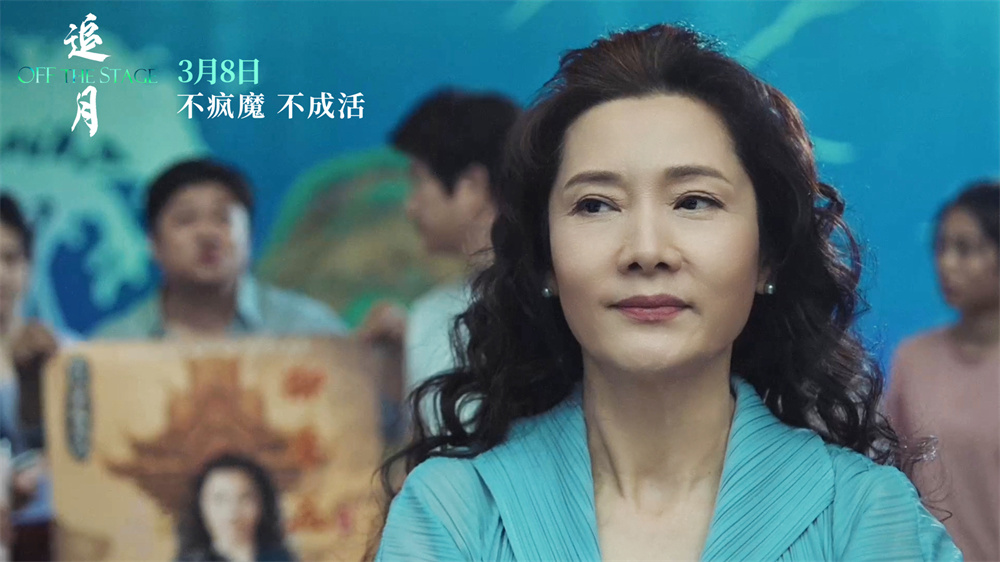
Teacher Qi (played by He Saifei)
"You can't live without going crazy" is a lingo in the opera world, made famous by the movie "Farewell My Concubine". The word "crazy" here refers to the performer's obsession with opera, as if he is possessed by it, completely immersed in it and unable to extricate himself. This state is manifested in awe of opera, long-term and hard training in skills, in-depth understanding of the role and deep involvement in the play, extreme seriousness in the performance, and unremitting exploration of the artistic realm.
"Not making a living" refers to the opera industry. If one does not reach this state of obsession, it will be difficult to develop superb skills, forget oneself and integrate with the character, and it will be difficult to contribute a stunning performance. Only by reaching the realm of "madness" and possessing extraordinary perseverance, devotion and sacrifice in art can we truly bring our characters to life and achieve extraordinary achievements on the road of art.
Many times, when people use "If you don't go crazy, you won't survive", it's a compliment. It's not only a high requirement for opera practitioners, but also an appreciation for those opera people who pursue the ultimate pursuit of art and devote themselves wholeheartedly.
Teacher Qi in the movie also has such brilliant moments. Teacher Qi, a famous Yue opera actor who became a hit when he was young because of his performance in "Chasing the Moon," suddenly returned to his hometown when he was old. She is usually an elegant and decent old man, but once the topic related to Shaoxing opera comes up, she immediately becomes "acting crazy", strict, dedicated and serious. As soon as she arrived at the home of her second son Xia Sheng (played by Lou Yujian), and saw that the makeup on the eyebrows on Xia Sheng's opera portrait was wrong, she immediately acted like a strict teacher and was "picky in every possible way". There was no tenderness at all between mother and son after many years of reunion.
Another example is that Teacher Qi returned to her hometown because time was running out and wanted to say goodbye to her three children. The theater troupe in her hometown invited her to be a consultant. This was originally a false position, but when Teacher Qi realized that the script might have been written by her ex-husband, The script was well written. She put her mind into it and devoted herself to the rehearsal of the play regardless of her illness. All she thought about was the play.
Whether it was Teacher Qi's lectures in the troupe cafeteria where no one was around, or her several demonstrations on the rehearsal stage, it was not only the highlight moment of Teacher Qi, but also the highlight moment of He Saifei's performance. Teacher Qi shows extraordinary persistence, devotion and enthusiasm in character creation, plot understanding and stage performance, reaching a state of selflessness, selflessness and ruthlessness.
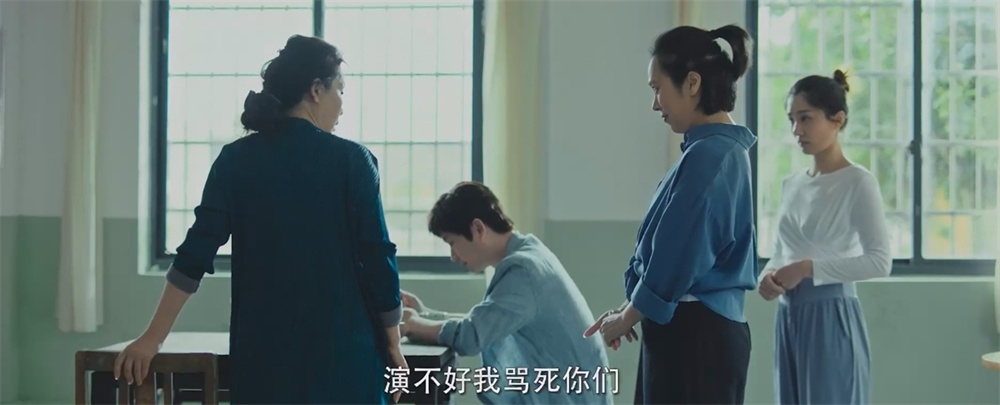
Teacher Qi instructs juniors in acting in the cafeteria
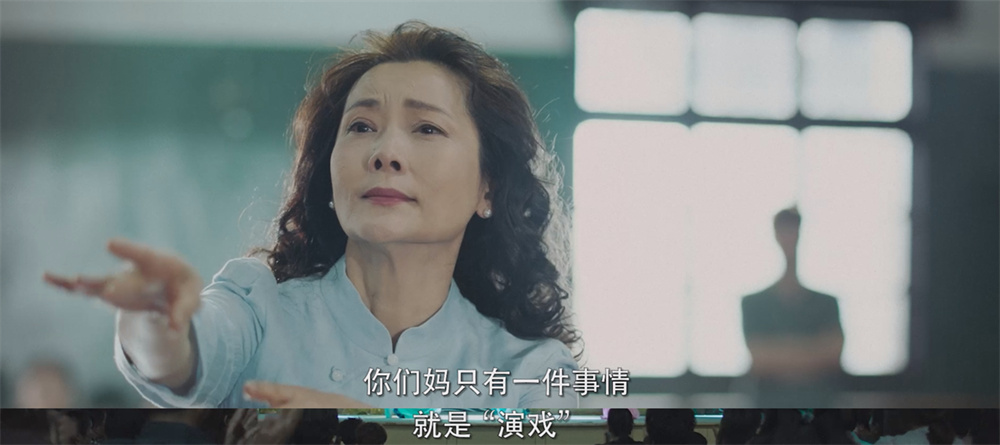
Teacher Qi gave a demonstration in person
However, what if a person who “doesn’t live without being crazy” is “crazy” beyond the boundaries?
Teacher Qi is an extremely selfish person in art. In the new play at the hometown theater, the heroine is her former apprentice Zhuang Lingling (played by Tu Ling). She once helped Teacher Qi take care of three children and was also Xia Sheng's lover. Zhuang Lingling also attaches great importance to this play, no matter where it comes from. From a perspective, Teacher Qi shouldn't have stolen Zhuang Lingling's heroine. But due to the temptation of the role, the temptation of the premiere, the temptation of the stage, or perhaps the emotion towards her ex-husband, Teacher Qi used dirty tricks to prevent Zhuang Lingling from completing the premiere and replaced him. Sure enough, artistic achievement and moral quality are not directly proportional.
What is more controversial about Teacher Qi is that she has never been a good wife or mother as we think in the world.
In the past, Teacher Qi went to the provincial capital for career development. In order to put "Chasing the Moon" written by her husband on the stage, she exchanged her body for the opportunity. "Do you know how difficult it is to be an actor?" "I am an actress, and I am just an ordinary actress." "I want to move "Chasing the Moon" to a bigger stage"...
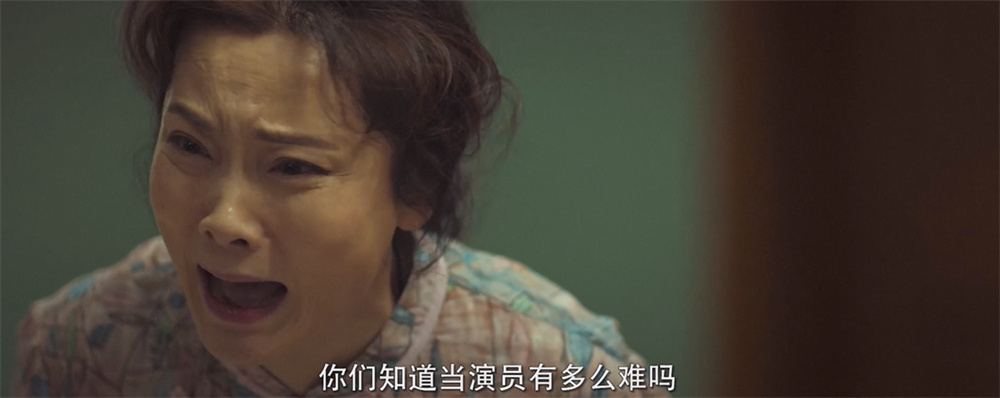
Teacher Qi defends himself
In the fierce confrontation scene with his eldest son Qiu Sheng (played by Yuan Wenkang), Teacher Qi defended himself for the first time regardless of elegance. The audience has their own moral judgment on Teacher Qi's choice, but the amount of information behind the lines also reflects Teacher Qi's hard work and painful sacrifice for art in his early years.
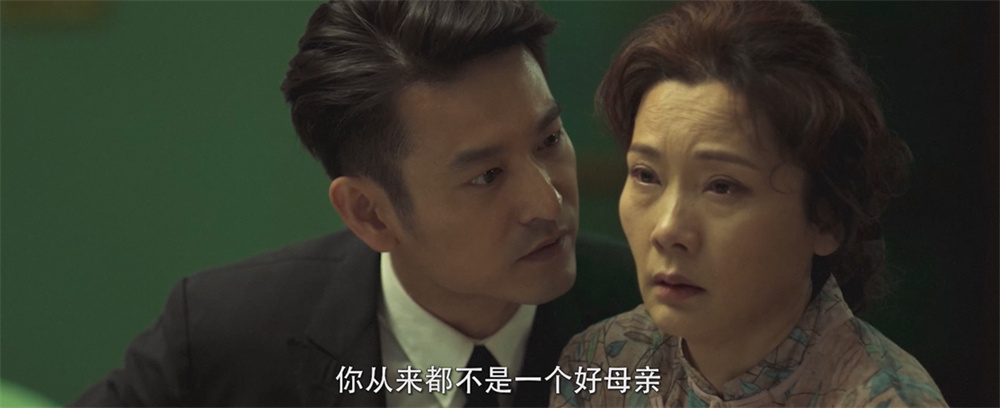
Qiu Sheng (played by Yuan Wenkang) accuses his mother
Teacher Qi has never been able to get the forgiveness of her three children, especially Qiu Sheng, because she is not a good mother. When Teacher Qi had an affair, Qiu Sheng reported it to his father. His father disappeared after the successful performance of "Chasing the Moon", leaving behind three children. Teacher Qi, on the other hand, focused on developing her career in the provincial capital and in a wider world. Apart from sending money back, she basically left her three children to "fend for themselves."
What Qiu Sheng has always been worried about is that when his sister Dong Hao accidentally became pregnant before marriage, Qiu Sheng took her sister to the provincial capital to meet her mother. Teacher Qi just asked Qiu Sheng to take her sister to have an abortion. She had to rush to Beijing to complete the more important task in her heart. show. As a result, Qiu Sheng beat people to death just to vent his anger, and sent himself to prison. Dong Hao, who had a miscarriage, also went crazy...
No matter how famous and skilled Teacher Qi is in the eyes of the outside world, in the hearts of the children, she is just a selfish, cold-blooded, irresponsible mother who is willing to abandon everything, including her own children, for her own artistic pursuit.
"Chasing the Moon" thus contributes a rare classic character on the movie screen, and also conducts a profound discussion on women's social gender identity, especially motherhood - if a woman is just a perfect ideal pursuer (Mr. Qi is an actor who has reached the top in art), but she is not a good wife, mother, or woman. How should we evaluate her?
What is certain is that the outside world has never been harsher on a mother. In the movie, Qiu Sheng's father actually knew about Teacher Qi's "sacrifice" for art. He was in pain, but chose to endure it. His son exposed the truth and his self-esteem was shattered. He disappeared after Teacher Qi successfully completed the performance. From his point of view, he wanted to fulfill Teacher Qi. Regardless of Qiu Sheng or Xia Sheng, they always had a loving impression of their father. They regarded their father as the "victim" in their marriage, so they never cared about his father's indifference. Is it irresponsible to leave three children behind?
Teacher Qi is limited by her "motherhood" status. Motherhood not only refers to women’s natural attributes of reproducing offspring and raising newborns, but also includes a social attribute: In many social cultures, women are generally given the main childcare responsibilities, and this expectation often leads to women’s career and career difficulties. They face difficult choices between family roles and create constraints on women’s career development and personal freedom. If Qiu Sheng's father went to the provincial capital to pursue his career and Teacher Qi stayed to take care of the children, everything seemed to be natural. However, if their identities were reversed, Teacher Qi would become an unqualified mother.
Perhaps, the point has never been how we should evaluate Teacher Qi, but when being a good wife and loving mother is the mainstream, when women trapped in motherhood are regarded as natural, the selfish, ambitious, and daring to pursue their own art created by "Chasing the Moon" The ideal, Teacher Qi, who does not hesitate to sacrifice other responsibilities, is meaningful in itself. It not only shows diverse humanity, but also challenges and subverts traditional female roles, triggers the audience's thinking about the situation of women, and prompts people to re-examine the conflict between motherhood and personal ideals.
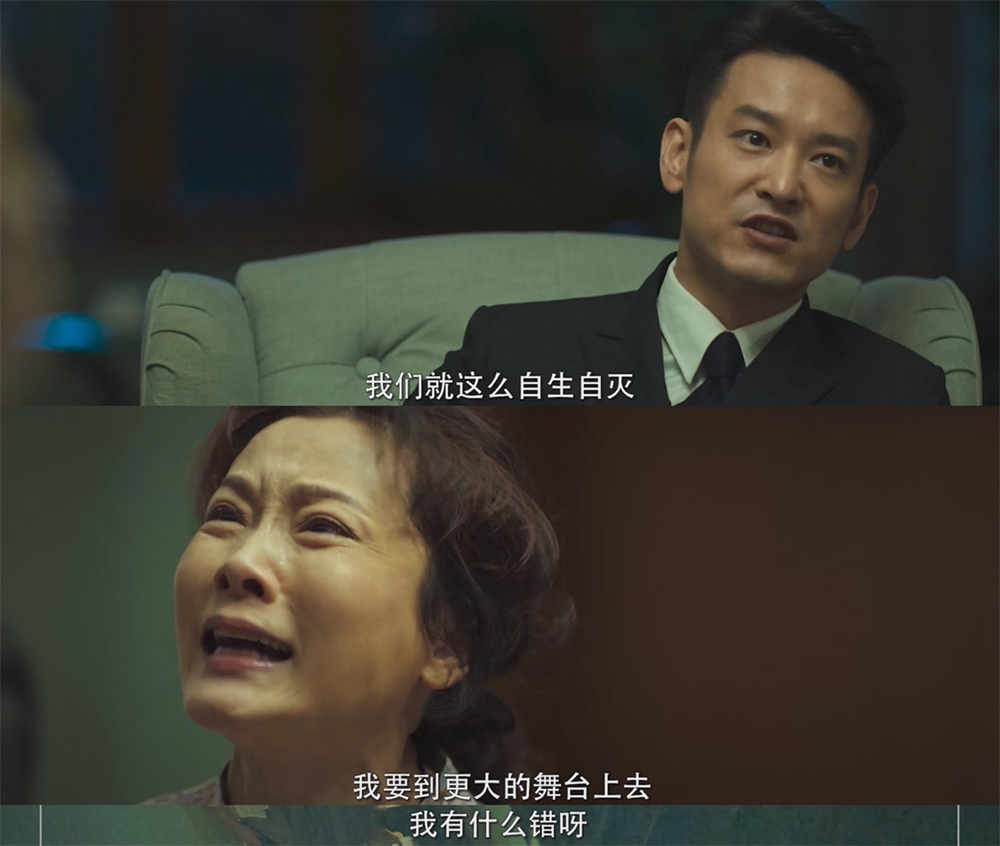
The conflict between motherhood and personal ideals
"Chasing the Moon" is Teacher Qi's famous work and a portrayal of her life experience. Teacher Qi is like Chang'e, abandoning everything in the world and rushing to the holy palace of art without hesitation. In our usual understanding, Chang'e is regretful. Li Shangyin wrote in his poem, "Chang'e should regret stealing the elixir, and her heart is filled with blue sea and blue sky every night." He imagined that Chang'e was in the quiet and cold moon palace, facing the blue sky like the blue sea, immersed in loneliness and regret every night, I deeply miss the warmth and family affection in the world, and regret that I have completely lost it. The Yue opera "Chasing the Moon" in the movie also sings the same thing, "Empty regrets, blue sea and blue sky, every night the mortal heart..."
Although Teacher Qi returned to her "maternal nature" at the last moment of her life, if she could live her life over again, would she really give up her career and return to her family if she was "not crazy and can't live"? Not necessarily. "Chang'e should regret stealing the elixir" is more like the imaginary woman in traditional social concepts, but for people like Teacher Qi, maybe she has never "regret stealing the elixir". Taking the elixir and flying to the moon, isn't it an act of Chang'e actively choosing her destiny? She is unwilling to settle for a mediocre life. Out of her yearning for freedom, independence and a higher artistic realm, she dares to cross the norm and step into an uncharted field, even though this road is full of loneliness and unknowns. What kind of courage and courage this requires!
There are too many stories about "Chang'e should regret stealing the elixir". Perhaps we need a story about "Chang'e does not regret stealing the elixir". This is the meaning of the character Teacher Qi and the value of the movie "Chasing the Moon".


